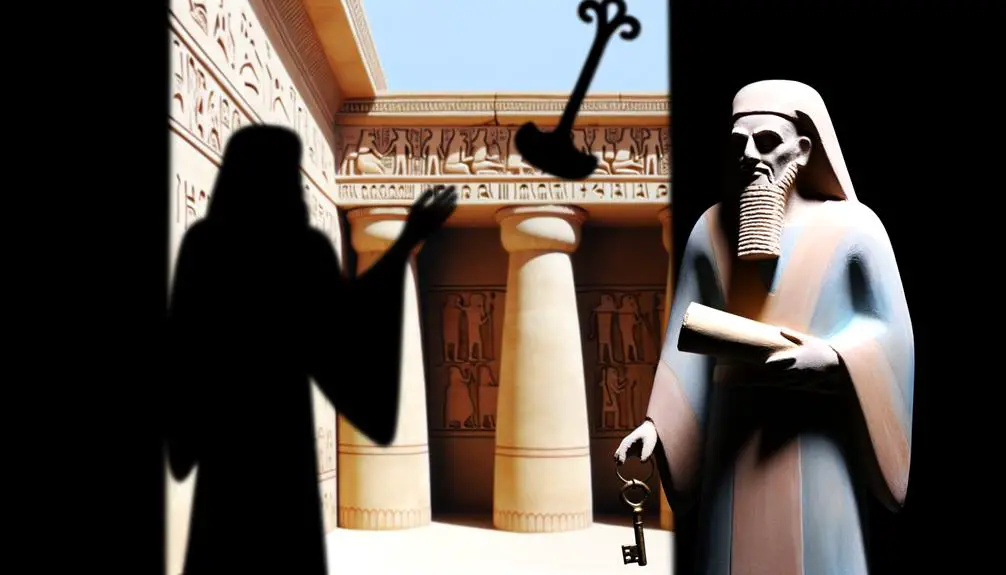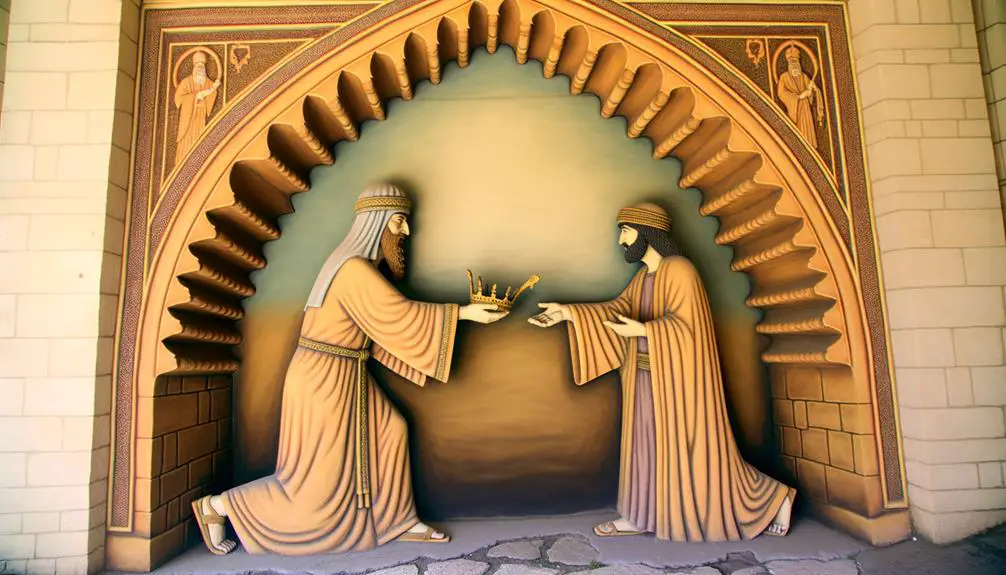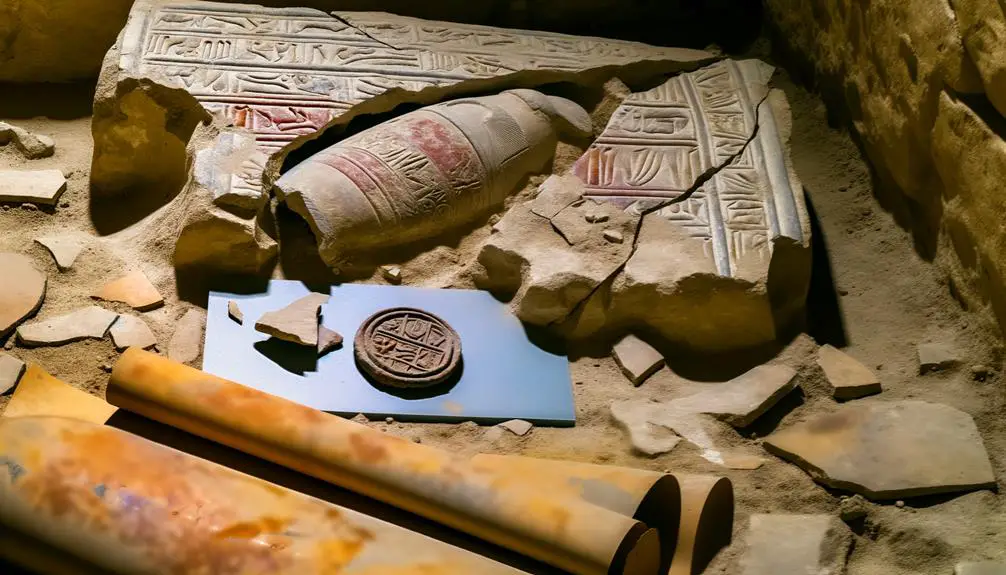Discover the intriguing downfall of Shebna in the Bible, a tale of power, pride, and prophetic judgment that leaves a lasting moral lesson.

Shebna in the Bible
In the grand narrative of ancient texts, Shebna's tale is gently described as a journey from prominence to a less celebrated end. You'll find his story nestled within the complex tapestry of Biblical history, where his role and influence are critical, yet his downfall serves as a poignant reminder of the perils of pride.
The prophetic rebuke he receives, his subsequent humiliation, and replacement by Eliakim are not just historical footnotes; they carry deep moral and theological implications. If you're intrigued by how power dynamics shift and what this might reveal about broader themes, Shebna's account offers a compelling case study.
Key Takeaways
- Shebna held significant administrative and decision-making roles in 8th century BCE Jerusalem, influencing its direction and policies.
- His downfall, as prophesied by Isaiah, serves as a warning against pride and misuse of power in leadership.
- Eliakim's contrasting leadership style to Shebna's emphasizes the importance of humility and divine approval in governance.
- Archaeological evidence, including inscriptions and artifacts, corroborates the historical existence and role of Shebna in biblical accounts.
Historical Context

To understand Shebna's role in biblical history, it's essential to delve into the political and social climate of Judah during the 8th century BCE, where he served as a high-ranking official. This period was marked by significant upheavals and shifts in power, making Shebna's position both precarious and influential. His lineage, though not explicitly detailed in biblical accounts, suggests he was of notable descent, possibly linked to families of high status or foreign nobility given his prominent role. This background would have afforded him a unique perspective on the cultural and political dynamics of the time, further enhancing his significance in the narrative.
Shebna's cultural significance can't be overstated. In a time when lineage and social standing dictated one's influence and authority, his elevated position within the royal administration indicates a man of considerable power and prestige. It's likely that his role extended beyond mere administration, involving him in critical decision-making processes and diplomatic negotiations. Understanding Shebna's background provides insights into the complexities of Judah's political landscape, highlighting the intertwining of personal ambition, familial ties, and national policy.
Moreover, Shebna's legacy, as evidenced by the archaeological and textual sources, underscores his impact on the cultural and historical fabric of his time. His actions, decisions, and even his conflicts with other officials reflect the broader themes of power struggle, loyalty, and the quest for legacy that permeated Judahite society. By examining Shebna's lineage and cultural significance, you gain a deeper appreciation for the intricate web of social, political, and personal dynamics that shaped the history of Judah during this tumultuous period.
Shebna's Role and Influence

You'll find that Shebna's political position was pivotal in shaping Jerusalem's direction during a tumultuous period. His influence extended beyond mere advisory roles, affecting both domestic policy and international relations.
Understanding his impact reveals the complexities of political power and its effects on a nation's trajectory.
Shebna's Political Position
Shebna held a significant political position in the ancient Kingdom of Judah, serving as a key advisor and steward to the king, which allowed him to wield considerable influence within the royal court. As a royal scribe, he was responsible for recording the king's decrees and the kingdom's important events, showcasing his integral role in the administration. His administrative duties extended beyond mere record-keeping; Shebna managed the king's properties, oversaw the treasury, and was involved in diplomatic missions.
Role |
Responsibilities |
|---|---|
Royal Scribe |
Recording decrees, documenting events |
Steward |
Managing royal properties, overseeing treasury |
Advisor |
Providing counsel to the king |
Diplomatic Agent |
Handling foreign diplomatic missions |
His multifaceted position underscored his indispensability in maintaining the kingdom's stability and prosperity.
Influence on Jerusalem
How did Shebna's multifaceted role within the royal administration impact Jerusalem's political and social landscape?
You'll find that his influence was profound, particularly in areas of urban development and religious practices.
Shebna's initiatives in urban development not only fortified the city's defenses but also enhanced its infrastructure, contributing to Jerusalem's stature and resilience against external threats.
Moreover, his role in religious practices can't be understated; he played a pivotal part in integrating religious ceremonies with daily life, thereby reinforcing communal identity and cohesion.
Through these endeavors, Shebna didn't just shape the city's physical and spiritual contours; he also left an indelible mark on its socio-political fabric, weaving his legacy into Jerusalem's historical tapestry.
Prophetic Rebuke

You'll find that Shebna's downfall wasn't merely a twist of fate but a consequence directly foretold by prophetic rebuke.
This divine judgment, expressed through the prophets, underscores the seriousness of Shebna's actions and their impact on his destiny.
It serves as a stark reminder of the weight of divine authority and the inevitability of accountability for one's deeds.
Shebna's Downfall Foretold
Facing a divine judgment, Shebna's position as royal steward was doomed to crumble, as foretold by the prophet Isaiah's stern rebuke. Isaiah's prophecy wasn't merely a warning; it was a detailed forecast of Shebna's downfall, emphasizing the futility of his earthly ambitions.
The carved inscriptions and elaborate tomb speculation that Shebna might've invested in, as a testament to his power and prestige, were highlighted by Isaiah as symbols of his hubris. These elements, meant to immortalize Shebna's status, instead underscored the transient nature of his earthly achievements.
Isaiah's rebuke served as a stark reminder that divine judgment doesn't regard human grandeur or the physical monuments people construct to their own importance.
Divine Judgment Expressed
Building on the grim forecast of Shebna's downfall, the divine judgment articulated through Isaiah's prophetic rebuke serves as a compelling demonstration of the consequences of hubris and misdirected ambition in the face of divine authority. The narrative underscores several critical points:
- Judgment reasons include Shebna's pride and misuse of power.
- His focus on self-aggrandizement, rather than service.
- The absence of repentance, highlighting a hard-hearted disposition.
- The inevitable downfall as a direct consequence of his actions.
This analysis reveals that divine judgment isn't arbitrary but a response to specific failings. It sends a clear message about the importance of humility and the dangers of pride, especially when entrusted with leadership, emphasizing that accountability is inevitable, particularly in the absence of repentance.
Downfall and Humiliation

Shebna's downfall and humiliation serve as a stark testament to the consequences of pride and misuse of power in a biblical context. His story unfolds as a cautionary tale, highlighting the intrinsic dangers of personal pride and the ethical responsibilities that come with leadership positions. In a setting where leadership ethics should guide actions, Shebna's narrative underscores the peril of allowing personal ambitions and pride to cloud judgment and moral compass.
The biblical account paints Shebna as a man who, intoxicated by his own position as the royal steward, forgets the servitude nature of his role. His actions, marked by extravagance and an overemphasis on his own legacy, starkly contrast the humility expected of someone in his position. This discrepancy between his conduct and the ethical standards expected of a leader sets the stage for his eventual humiliation.
Shebna's fall from grace isn't merely a personal tragedy but serves as a divine reprimand for his failure to uphold the values and responsibilities of his office. The narrative delves deep into the consequences of neglecting leadership ethics, illustrating how personal pride can lead to public downfall. His story serves as a potent reminder that positions of power come with a duty to serve with integrity and humility.
As Shebna's tale unfolds, it becomes evident that his humiliation isn't just a result of divine intervention but also a natural consequence of his actions. His disregard for the ethical dimensions of leadership not only leads to his personal downfall but also serves as a moral lesson on the dangers of pride and the misuse of power.
Replacement by Eliakim

In a decisive turn of events, Shebna was replaced by Eliakim, marking a pivotal shift in the biblical narrative of leadership and divine will. This moment highlights the stark contrast between Shebna's downfall and Eliakim's rise, underscoring the dynamic interplay of human actions and divine intentions within leadership transitions.
Eliakim's elevation to Shebna's former position wasn't just a simple replacement; it was a significant redefinition of leadership styles and divine favor. Here's why Eliakim's rise was crucial:
- Divine Approval: Unlike Shebna, whose actions led to his downfall, Eliakim was seen as a man with God's backing. This divine approval was crucial, signaling a move towards leaders who weren't just politically savvy but also spiritually aligned.
- Leadership Styles: Eliakim's leadership style contrasted sharply with Shebna's. Where Shebna may have been more self-serving, Eliakim was perceived as a servant leader, prioritizing the welfare of the people and the kingdom.
- Stability: Eliakim's appointment brought a sense of stability and hope. His leadership was seen as a chance to correct the wrongs and steer the kingdom back towards prosperity and divine favor.
- Symbolism: The replacement of Shebna by Eliakim served as a powerful symbol of God's involvement in the affairs of men, especially in the appointment and removal of leaders.
Eliakim's rise to prominence wasn't just a testament to his personal virtues but also a critical reflection on the qualities valued in leadership. It underscored the importance of alignment with divine principles and the impact of leadership styles on a nation's fate.
Archaeological Evidence

While the biblical narrative vividly recounts the transition from Shebna to Eliakim, archaeological findings provide tangible evidence of this historic shift, shedding light on its real-world implications. You're stepping into a realm where ancient stories meet palpable proof, guided by the meticulous application of dating techniques and the principles of artifact preservation.
Archaeologists, employing radiocarbon dating and stratigraphy, have unearthed artifacts and inscriptions that corroborate the timeline and events described in biblical texts. These items not only validate the historical account but also offer a glimpse into the societal and political atmosphere of the period. The preservation of these artifacts, through both environmental conditions and deliberate conservation efforts, allows you to connect with a pivotal moment in history.
Consider the emotional impact of the following table, where each entry represents a bridge between the past and present:
Artifact Type |
Significance |
Emotional Impact |
|---|---|---|
Inscriptions |
Confirm Shebna's existence and role |
Awe and connection to the past |
Seals |
Indicate administrative authority |
Curiosity about governance and power |
Pottery |
Reflect daily life and culture |
Nostalgia for a bygone era |
This table encapsulates the essence of archaeological evidence related to Shebna and Eliakim, transforming abstract historical figures into tangible realities. It's a testament to the power of archaeology to evoke emotion and deepen our understanding of history.
As you delve into the details of artifact preservation and the precision of dating techniques, you're not just uncovering facts. You're piecing together a narrative that bridges millennia, offering insight into the transition from Shebna to Eliakim and its significance within a broader historical and cultural context.
Moral and Theological Implications

Exploring the moral and theological implications of the transition from Shebna to Eliakim reveals a rich tapestry of lessons on leadership and divine authority. This pivotal moment underscores the importance of personal accountability and ethical leadership in the eyes of both God and society. The narrative teaches that leadership isn't merely a position of power but a divine calling that demands integrity, humility, and a commitment to the well-being of the people.
- Personal Accountability: You're reminded that actions have consequences, especially for those in positions of authority. Shebna's downfall is a testament to the idea that personal ambition and misuse of power can lead to divine retribution.
- Ethical Leadership: The story illustrates the critical need for leaders to embody ethical principles in their decision-making processes. Eliakim's appointment signifies a shift towards leadership that isn't only competent but also morally upright and in service to the community.
- Divine Authority and Will: You see that leadership appointments and depositions are ultimately under divine control. This teaches the importance of seeking divine guidance and aligning one's actions with God's will.
- Community Welfare over Personal Gain: The transition highlights the principle that leaders should prioritize the welfare of the people they serve over personal gains or prestige.
In analyzing these aspects, it's clear that the narrative of Shebna and Eliakim isn't just a historical account; it's a profound lesson on the qualities of leadership that are pleasing to God. It calls you to reflect on the essence of true leadership, which is characterized by accountability, ethical conduct, and a heart for service.
Frequently Asked Questions
How Does Shebna's Story Relate or Compare to Contemporary Political Figures or Scandals?
You're exploring how historical narratives of power dynamics and leadership ethics resonate with today's political dramas.
Shebna's story, though not explicitly mentioned, parallels modern scandals where leaders are ousted or discredited due to unethical behavior.
It highlights the timeless nature of political intrigue and the consequences of abusing power.
Are There Any Artistic or Literary Works Inspired by the Story of Shebna?
In the world of art and literature, certain stories serve as a canvas for deeper messages.
You'll find Shebna's narrative has inspired a range of artistic representations and literary adaptations, each interpreting the tale through a unique lens.
These works delve into themes of power, downfall, and redemption, analyzing their implications with authority and detail.
They not only recount a historical account but also offer a mirror to society's own reflections and critiques.
Has Shebna Been a Character of Interest in Any Modern Religious Debates or Interpretations?
You've probably wondered if modern religious debates or interpretations have focused on Shebna's leadership and its historical accuracy.
Indeed, Shebna has been a point of discussion among scholars and theologians. They delve into his leadership qualities and question the historical accuracy of his portrayal.
This analysis isn't just academic; it influences how religious teachings are interpreted today, underscoring the relevance of ancient figures in contemporary religious thought.
What Are the Psychological Interpretations of Shebna's Actions and Downfall?
In today's deep dive, you're exploring the psyche behind power grabs and falls from grace. Power dynamics play a critical role, shaping actions and reactions.
Through the lens of psychological projection, one can understand how projecting insecurities onto others can lead to one's downfall. This analysis isn't just about historical figures; it's about understanding the human condition.
You'll find that these patterns are timeless, offering insights into behavior and consequences.
How Has Shebna's Story Been Integrated or Referenced in Popular Culture or Media Outside of Religious Texts?
You're exploring how a narrative has permeated popular culture, specifically through music interpretations and video games. The story, stripped of its religious origins, offers a rich tapestry for creative expression.
Musicians have woven its themes into their lyrics, encapsulating the essence of downfall and redemption.
Video games, on the other hand, have adopted its narrative arc, integrating characters and plots that mirror the original tale's complexity and moral lessons.
Conclusion
In examining Shebna's story, you're confronted with a potent example of pride leading to downfall, a theme resonating deeply across ages. Imagine a modern political advisor, much like Shebna, leveraging influence for personal gain, only to face public disgrace. This real-life parallel underscores the timeless warning against hubris and the value of humility.
Shebna's replacement by Eliakim further illustrates the principle that true leadership stems from character, not position. Analyzing Shebna's narrative, you gain insight into the enduring moral and theological lessons embedded within these ancient texts.



Sign up